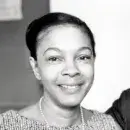
Mamie Phipps Clark
Mamie Phipps Clark was a distinguished psychologist who worked with her husband to conduct research about children. Known for their 1940s experiments using dolls to assess children’s attitudes about race, the Clarks testified as expert witnesses in Briggs v. Elliott (1952), one of five cases combined into Brown v. Board of Education (1954). The Clarks’ work was cited in the ruling of the U.S. Supreme Court that determined that de jure racial segregation in public education was unconstitutional.
Born in Hot Springs, Arkansas, Mamie Phipps was educated at Howard University (B.S., magna cum laude, in math and physics, 1938; M.A. in psychology, 1939) and Columbia University (Ph.D. in experimental psychology, 1943), where she was the first Black woman to earn a doctorate in psychology. When the Clarks published “The Development of Consciousness of Self and the Emergence of Racial Identification in Negro Preschool Children” (1939), based on Mamie’s master’s thesis and now a classic of developmental psychology, little experimental research had been done concerning the development of children’s consciousness and sense of self.
By 1943, the Clarks developed the “Dolls Test,” in which Black children ages three through seven were shown four dolls that were identical, save for a few key features: skin, hair, and eye color. This experiment found that many of the Southern children attending segregated schools internalized and passively accepted the idea that they were inferior to white children, while the children from racially mixed schools were more aware that racial discrimination against them was unjust. The Clarks concluded that integration was key to helping children develop healthy racial self-identification.
In the 1940s, Mamie worked as a testing psychologist at the Riverdale Home for Children, where she counseled homeless Black girls and saw that the issues her patients faced reflected a racist society that failed to provide social services for minority children. In response to her experience at the Riverdale Home, the Clarks opened the Northside Testing and Consultation Center, later renamed the Northside Center for Child Development in 1946, where Mamie served as executive director until 1980. The Center provided psychological services to Black children in Harlem and conducted experiments on racial biases in education. In 1962, the Clarks created Harlem Youth Opportunities Unlimited, which provided resources for Harlem schools and reduced unemployment among Black citizens who had dropped out of school.
Photo of Mamie Phipps Clark from the Columbia University Archives.